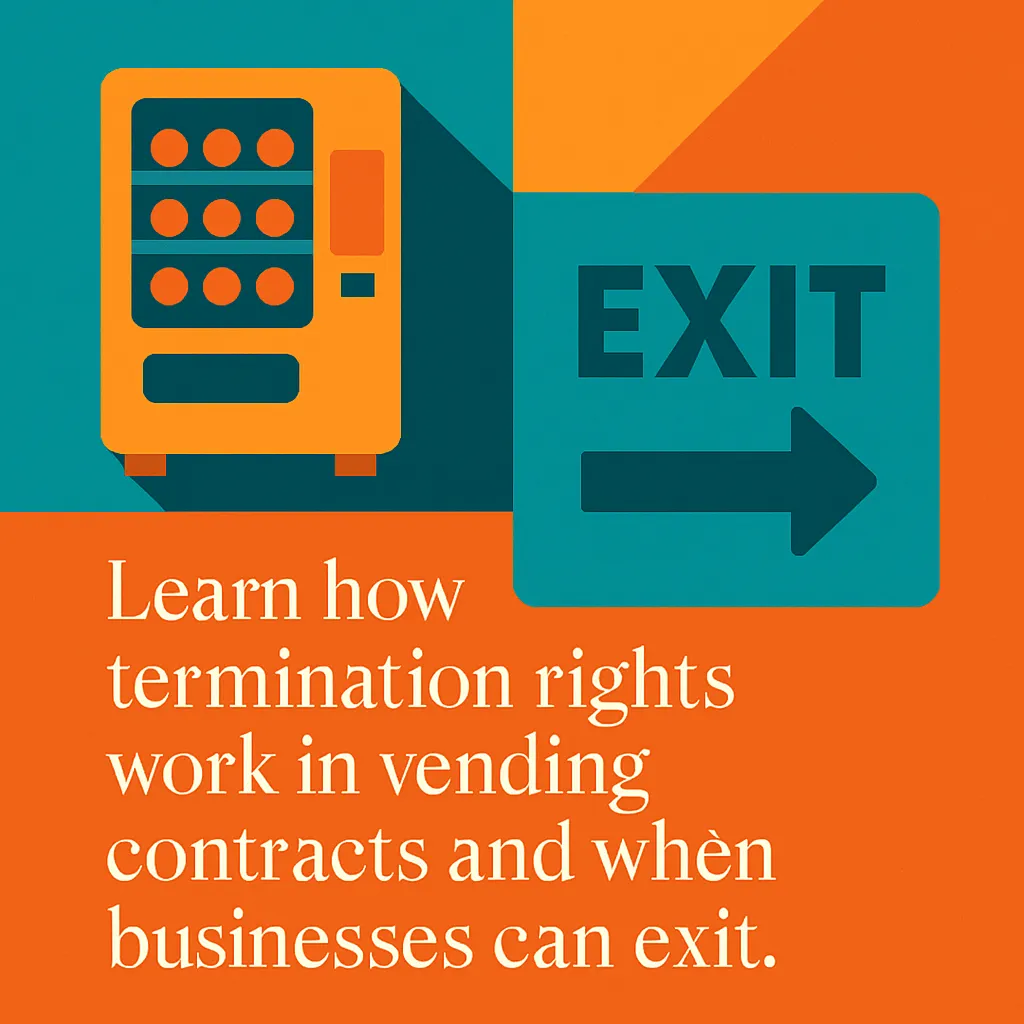Termination Clauses in Vending Agreements
Learn how termination rights work in vending contracts and when businesses can exit.
Back to Vending Contracts ResourcesLearn how termination rights work in vending contracts and when businesses can exit.
Back to Vending Contracts ResourcesDelving into termination clauses is crucial for any business considering vending services, as they define the rights and obligations of both parties if the agreement needs to end early.
![]() Clarity on conditions for contract expiration or early exit
Clarity on conditions for contract expiration or early exit
![]() Protection against sudden service withdrawal or unexpected costs
Protection against sudden service withdrawal or unexpected costs
![]() Guidance on notice periods, penalties, and dispute resolution
Guidance on notice periods, penalties, and dispute resolution

Entering into a vending agreement can bring numerous benefits to your business, from boosting employee morale with convenient snacks to providing a service for your customers. However, just as important as understanding the initial terms of service is grasping the intricacies of how to end that arrangement. This is where termination clauses come into play, serving as a critical safety net that defines the conditions under which a contract can be dissolved. Without a clear understanding, businesses risk unexpected costs, service disruptions, or legal entanglements.
A well-drafted termination clause typically outlines several scenarios. These include termination for cause, such as a breach of contract (e.g., consistent failure to restock machines or maintain equipment), or termination for convenience, which allows either party to end the agreement without specific fault, usually with a defined notice period and sometimes a fee. Understanding these nuances can significantly impact your business's flexibility and financial exposure if circumstances change. For a deeper dive into contract specifics, it's beneficial to review resources like common clauses in vending contracts.
Before committing to any vending agreement, businesses should meticulously review the termination clause. Key aspects to scrutinize include the required notice period, any early termination fees, and the conditions that constitute a "breach" allowing for immediate termination. Is there a "cure period" that allows the defaulting party to fix the issue before the contract is fully terminated? What happens to the equipment upon termination? Answers to these questions are vital. When evaluating potential agreements, consider leveraging guides on questions to ask before signing a vending contract to ensure all bases are covered.
Negotiating the terms of a termination clause is often possible and highly recommended. For instance, a business might want to negotiate a shorter notice period or reduce potential early termination fees. Businesses can also push for terms that allow termination if specific performance metrics (like sales targets or uptime guarantees) are not met. Having a solid negotiation strategy can save your business from future headaches and ensure the contract truly serves your long-term interests. Resources like how to negotiate a vending contract can provide valuable insights for this process.
Ultimately, a robust termination clause is a sign of a transparent and professional vending partnership. It ensures that both parties understand their rights and responsibilities, providing a clear pathway for disengagement if necessary. By investing time upfront to understand and potentially negotiate these clauses, you safeguard your business against unforeseen challenges and ensure greater peace of mind with your vending services.
A termination clause outlines the conditions under which either party can end the vending service contract before its natural expiration date.
They protect both the business and the vending service provider by defining clear procedures, rights, and potential penalties for prematurely ending an agreement.
Common reasons include breach of contract by either party, unmet performance metrics, business closure, or a change in business needs.
Some contracts allow for termination without cause, often requiring a specific notice period and potentially a penalty fee.
A cure period is a specified timeframe given to a party in breach of contract to rectify the issue before the other party can proceed with termination.
Costs can include liquidated damages, lost revenue for the vending provider, removal fees, or forfeiture of any upfront setup costs.
Notice periods vary but commonly range from 30 to 90 days, as specified in the contract.
Absolutely. Understanding the termination clause is crucial to avoid unexpected costs or disputes if circumstances change.
Yes, many aspects of a vending contract, including termination clauses, are negotiable and can be tailored to fit your business's needs.
The contract usually specifies that the equipment ownership remains with the vending provider, who will arrange for its removal within a stipulated timeframe.